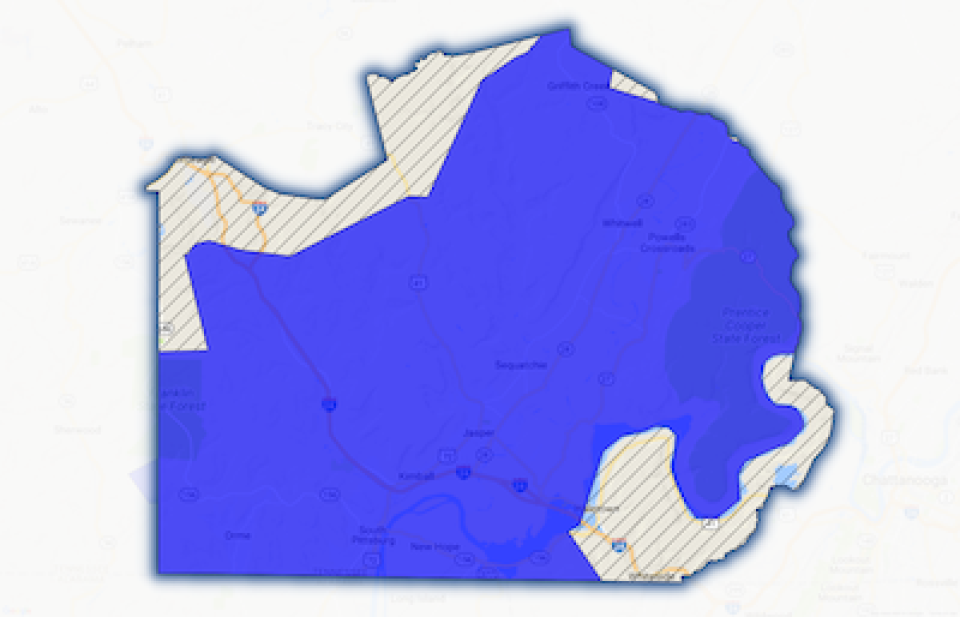
Since the passing of the Tennessee Broadband Accessibility Act (TBAA) in 2017, the state has poured more than $100 million into connecting its most rural communities, and more than 20 electric cooperatives throughout the state have spent the last four years making their way into the broadband business.
Back in 2016 and 2017, Sequachee Valley Electric Cooperative (SVEC), along with many other electric cooperatives, advocated for the right to build fiber-to-the-home (FTTH) networks out to their memberships in the most rural parts of the state. When TBAA passed through the state legislature, removing major barriers for cooperatives to build out their own networks, SVEC got to work.
Today, 23 electric cooperatives in Tennessee have launched their own broadband projects, including SVEConnect, a broadband subsidiary of SVEC offering FTTH that has connected more than 4,400 members across Marion County.
From Electrification to Connectivity
SVEC was formed in 1939 to address the broad gaps in access to electricity throughout the rural areas surrounding Chattanooga, Tennessee in Bledsoe, Grundy, Marion and Sequatchie counties. When the cooperative was first established, the nonprofit’s leaders would frequent community events at churches and neighborhood gatherings, keeping their fingers on the pulse of community needs. The cooperative began offering an essential service: electricity.

More than 80 years later, a new disparity in service was emerging: members in SVEC’s service area were not receiving the same high-speed Internet options that were offered in urban areas around the state.
A problem remained, however. In Tennessee, broadband wasn’t listed in the state statute definition of the “community utility services” cooperatives were allowed to provide. Despite the fact that this perceived restriction is in direct violation of Section 253 of the 1996 Telecommunications Act, it became a barrier for electric cooperatives like SVEC. As more communities got connected, the rural corners of the state that overlap with electric cooperative service territories remained under connected or completely untouched.
“But then you had the rural legislators that said, ‘if somebody’s willing to step up [to build out to our constituents], we’re willing to help you,’” Partin said. “After a very contentious session, we arrived at some language that everyone could agree on and allowed us the opportunity to get into the Fiber-to-the-Premise business.”
In 2017, the TBAA passed, allocating millions of dollars to build out to rural areas and opening the door for co-ops to join the market. And just like with electricity decades before, SVEC used the same boots-on-the-ground outreach method to connect with membership and find out if there was interest in SVEC offering broadband.
“We went out into these rural communities here and said, ‘This is what we want to do and are you with us?’” said Mike Partin, President and CEO of SVEC in a recent interview. “And we just had overwhelming support.”

In 2018, SVEC announced SVEConnect would bring FTTH to Marion County using the fiber ring it had already built to connect its substations and facilities to help build a smart grid for its electric service. By November 2020, SVEConnet completed the fiber optic buildout to the whole county, hanging nearly 700 miles of fiber.
"We completed the project in half the time we planned, and we have been able to achieve a 40% service take rate,” Mike Birdwell, Director of Ancillary Services for SVEConnect told the Times News.
The total cost of the project was more than $20 million, with 20 percent of the funds coming through grants and the rest covered by loans, Partin said.
Today, SVEConnect passes more than 11,000 businesses and homes. The ISP offers two triple-play options (bundling Internet, phone, and cable) with two speed options: 200 Megabits per second (Mbps) symmetrical for $190/month and 1 Gigabit per second (Gbps) symmetrical for $215/month. Both of those speeds are available without bundling for $50/month and $80/month, respectively.
Obstacles Still Exist for Munis in Tennessee
The Tennessee Broadband Accessibility Act did not remove existing barriers for municipal networks and upon passage ILSR criticized the legislation for lining the pockets of monopoly providers like AT&T. While it did get rid of a barrier for electrical cooperatives, municipalities are only allowed to build if they operate an electric utility, and even then they are not allowed to build beyond their electric footprint.
Additionally, Tennessee's electric cooperatives interpret state statute to mean they are not allowed to build over telephone cooperative service areas. A large portion

of SVEC’s service territory overlaps with telephone cooperatives, Partin said. So for now, SVEC is only serving Marion County.
“I’m really hemmed up, so to speak,” Partin said. “What zip code you live in should not determine the speed of your Internet service.”
There have been talks about addressing some of these issues throughout the state. But for now, Partin said SVEConnect is focused on bringing the best possible service to s members in its initial build-out area..
“Our kids are going to have the same opportunities; our businesses are going to have the same opportunities; our [economy] is going to have the same opportunity because we’re going to make it a level playing field when it comes to having access to high speed Internet.”
Header image courtesy of Flickr user Andrew Steele.









